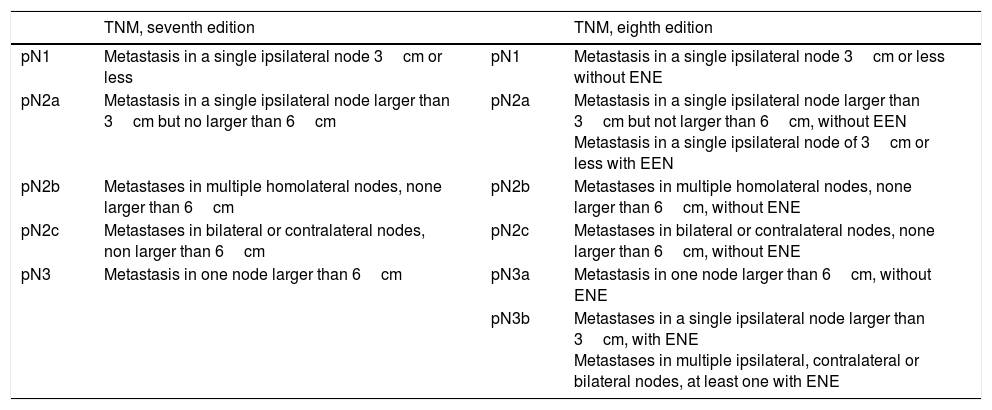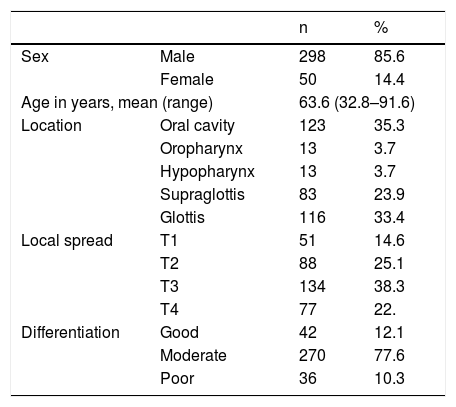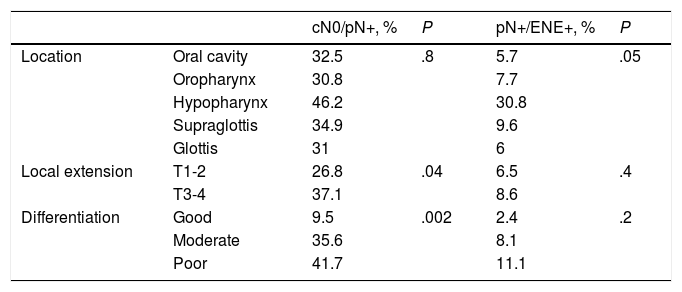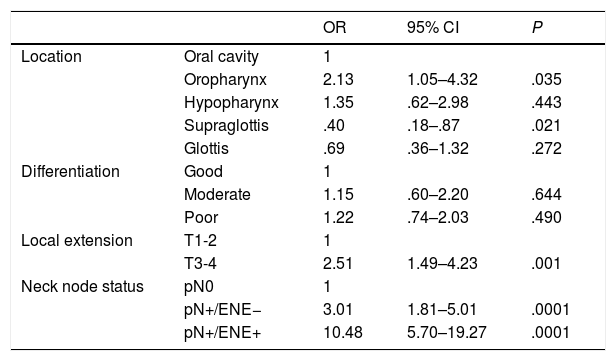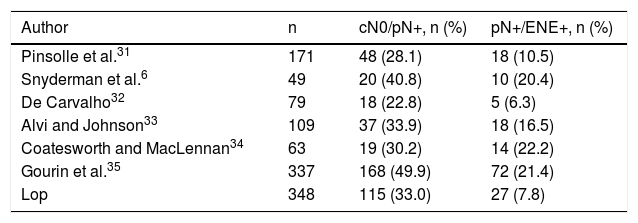Extranodal extension in nodal metastases is an independent adverse prognostic factor in head and neck squamous cell carcinoma patients. However, few studies specifically address the subgroup of patients with no clinical evidence of nodal disease.
Material and methodsWe retrospectively analysed data from 348 head and neck squamous cell carcinoma patients without any previous treatment and lacking clinical or radiological evidence of neck node metastases during the initial workup, treated with an elective neck dissection between 1992 and 2014. The incidence of occult metastatic neck nodes with extranodal extension and the impact of extranodal extension in survival were evaluated.
ResultsThe proportion of patients with occult neck node metastases was 33%. Of these, 23.5% had at least one metastatic neck node with extranodal extension. There were significant differences in the disease-specific survival rate according to neck node status. Five-year disease-specific survival for patients without histopathological metastases was 90%, for patients with occult neck node metastases without extranodal extension it was 71.2%, and for patients with occult neck node metastases with extranodal extension it was 25.9% (P=.0001). The multivariate analysis revealed that the presence of occult node metastases with extranodal extension was the factor with strongest impact on survival. The inclusion of the extranodal extension as a criterion of histopathological evaluation in the 8th TNM classification edition improves the prognostic capacity compared to previous TNM editions.
ConclusionsAppearance of metastatic neck nodes with extranodal extension is an adverse prognostic factor in head and neck squamous cell carcinoma patients without clinical evidence of regional disease during the initial workup of the tumour.
La presencia de extensión extranodal en adenopatías metastásicas de pacientes con carcinoma escamoso de cabeza y cuello es un reconocido factor de mal pronóstico. Sin embargo, pocos estudios analizan específicamente su significado en pacientes sin evidencia clínica de extensión ganglionar en el momento del diagnóstico inicial.
Material y métodosEstudio retrospectivo de 348 pacientes con carcinoma escamoso de cabeza y cuello cN0 tratados con un vaciamiento cervical electivo. Se evaluó la presencia de metástasis ganglionares ocultas con extensión extranodal y se analizó su impacto sobre la supervivencia.
ResultadosEl porcentaje de pacientes con metástasis ganglionares ocultas fue del 33%. De estos, un 23,5% presentaron al menos una adenopatía metastásica con extensión extranodal. Existieron diferencias significativas en la supervivencia específica en función del estatus ganglionar. La supervivencia a los 5 años para los pacientes sin afectación ganglionar patológica fue del 90%, para aquellos con metástasis ganglionares ocultas sin extensión extranodal, del 71,2%, y para los pacientes con metástasis ganglionares ocultas con extensión extranodal, del 25,9% (p=0,0001). En un estudio multivariante la presencia de metástasis ganglionares ocultas con extensión extranodal fue el factor relacionado de forma más importante con la supervivencia. La incorporación de la extensión extranodal como criterio de clasificación histopatológico en la octava edición del TNM mejoró la capacidad pronóstica en relación con las ediciones anteriores.
ConclusionesLa presencia de adenopatías metastásicas con extensión extranodal es un factor de mal pronóstico en pacientes con carcinoma escamoso de cabeza y cuello sin evidencia clínica de afectación regional en el momento del diagnóstico de la enfermedad.







